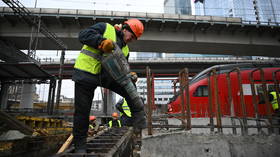Russian MPs approve language tests for children of migrants

The Russian national school system will not provide free education to children of foreigners who fail to pass a basic language test, according to a new law passed on Wednesday by the State Duma.
The legislation was introduced by lawmakers from all five factions in the lower chamber of the Russian parliament with the backing of Speaker Vyacheslav Volodin.
It is part of a larger legislative effort to curb criminality linked with guest workers. The parliament has passed over a dozen relevant amendments this year. The speaker has asked the Foreign Ministry to explain the rationale behind them to foreign governments.
”We are fighting illegal migration and do everything to invite prepared people who respect our laws and traditions,” Volodin said during the session.
The changes to the school rules will enter force in April 2025. They authorize the government to test children of foreign nationals who enroll in Russian schools for fluency sufficient to comprehend the lessons. Those who fail will be barred from regular schools as an exception to the universal right of minors to free basic education. Applicants will also need to prove that they have legitimate residency rights.
The total number of foreign nationals living in Russia stands at 14.5 million to 16.5 million, according to Aleksandr Bastrykin, the head of the Russian Investigative Committee. Interior Minister Vladimir Kolokoltsev estimated in late October that 740,000 people are staying in Russia illegally.
Irregular migration has long been a hot button topic in the country, but became particularly acute after a terrorist attack in March at the Crocus City Hall theater near Moscow, in which 145 people were killed. It was conducted by four Tajik nationals, according to investigators. Many of the people suspected of aiding and abetting them were foreign nationals from Central Asia, some with a history of breaking the law.
Among the changes introduced in Russia in 2024 is the creation of a list of migrants caught for various violations, which the Interior Ministry will update. The rights of people on the list will be significantly restricted if they are allowed entry. They will be barred from certain jobs, will not be able to buy real estate or vehicles, start businesses, marry, use banking services, or travel freely between various parts of Russia.
Russian MPs have also ramped up punishments for the organization of illegal migration, made the deportation of rulebreakers simpler, and cracked down on loopholes such as arranged marriages with Russian citizens.












